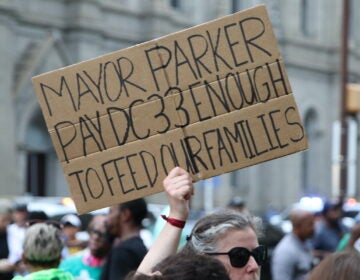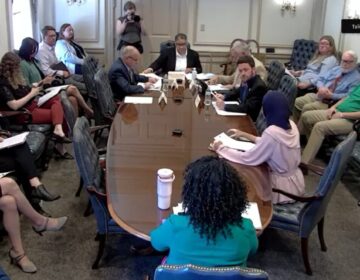Federal judge to rule on Stein recount push Monday
Listen
Green Party presidential candidate Jill Stein speaks with reporters outside the federal courthouse in Philadelphia where a judge heard arguments on her bid for a recount of presidential votes. (Emma Lee/WHYY)
On Monday, a federal judge plans to issue a ruling on Green Party candidate Jill Stein’s push for a recount of Pennsylvania’s presidential vote.
During a Friday hearing in Philadelphia, Stein’s lawyers said Pennsylvania’s voting machines are vulnerable to hacking, despite the fact they are not connected to the internet. The possibility that the machines could have been subject to cyberattacks, combined with results that defied polling, warranted a limited recount, Stein’s lawyers said.
“This was the second closest election in the history of Pennsylvania,” said attorney Ilann Maazel.
Attorneys for the state and for President-elect Donald Trump and Vice President-elect Mike Pence cited the Stein camp’s “complete failure to allege any evidence” hacking actually occurred in Pennsylvania.
Lawrence Tabas, general counsel to the state’s Republican Party, said Stein — who garnered about 1 percent of the vote in Pennsylvania — also “has not been able to assert … any injury or even any identifiable harm” and argued she lacked the standing to bring a case to federal court.
For most of the more than two-hour hearing, Judge Paul Diamond listened to testimony from two dueling computer science experts.
J. Alex Halderman, a cybersecurity expert from the University of Michigan, spoke on Stein’s behalf.
He explained how hackers could access Pennsylvania’s voting machines by either physically tampering with them or attacking them remotely by injecting malware onto the systems that design the ballots and are later installed on voting machines.
Michael Shamos, an electronic voting expert from Carnegie Mellon University, said these scenarios “are about as likely that androids from outer space are living among us.”
Shamos, who testified on behalf of the state, argued that hacking an electronic voting machine in a university computer lab is different than doing so in real life, where these machines are locked up in a warehouse. Infiltrating them would require breaking and counterfeiting special seals attached to the machines to detect tampering.
Halderman insisted a forensic audit of a sample of Pennsylvania voting machines would take only about two days. The result, he said, would be due process for voters who were unsure their choice was counted during an election marked by hacked campaign emails.
“We’ve never seen a presidential election that’s been so affected by this,” he said.
But on cross-examination, Halderman admitted saying in previous news reports that he believed the more likely explanation for Trump’s victory was that pre-election polls predicting a win for Hillary Clinton were wrong.
“I think this year it probably is more likely that the polls were wrong than that there was a cyberattack, but I think they’re both significant possibilities,” he said during a press conference after Friday’s hearing. “And I think we owe it to the public to do the investigation, to look at the evidence and find out which of those is right.”
Judge Diamond said he plans to rule “first thing” on Monday, just one before the state’s deadline to certify the election results.
WHYY is your source for fact-based, in-depth journalism and information. As a nonprofit organization, we rely on financial support from readers like you. Please give today.




